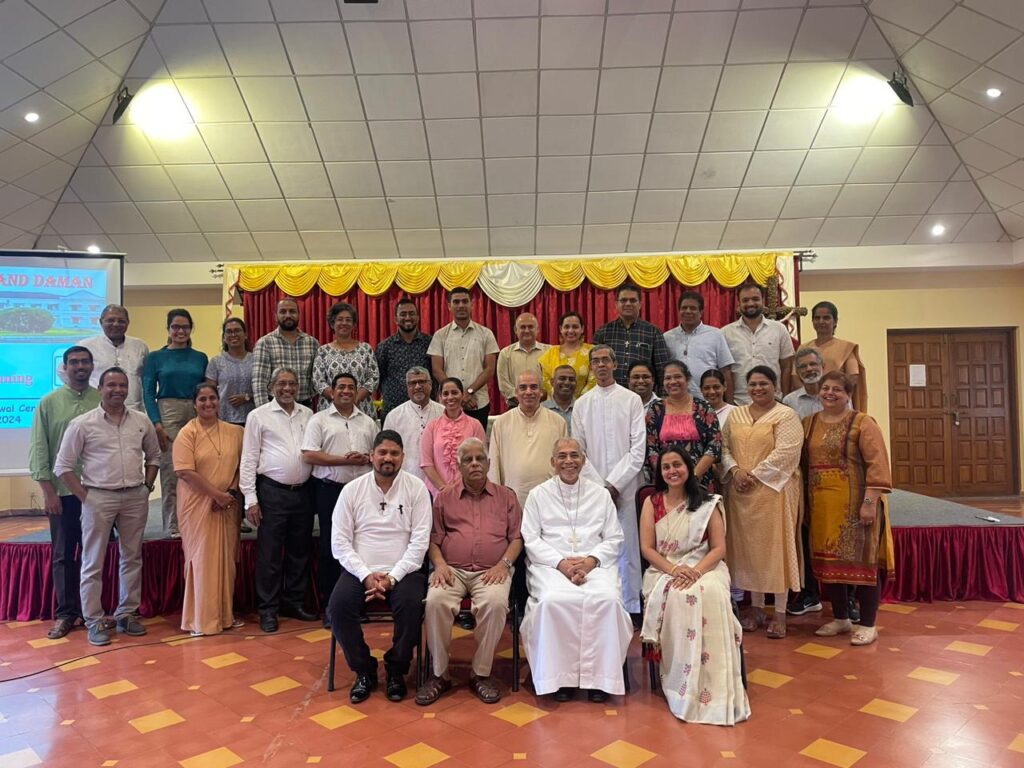Report of CCBI Strategic Planning Workshop
Archdiocese of Goa and Daman
A full-day workshop aimed at developing a Strategic Planning framework for the Conference of Catholic Bishops of India (CCBI) was organized by the Archdiocese of Goa and Daman, on February 26th, 2024, from 9:00 am to 4:00 pm at the St. Joseph Vaz Spiritual Retreat Centre, Old Goa. In total, all 32 invited participants were present, including the Archbishop, His eminence Filipe Neri Cardinal Ferrao, who is also currently serving as the CCBI president, Vicar General, Fr. Jose Remedios Fernandes, Episcopal Vicars Frs. Leonardo de Souza and Lucio Dias, a few Deans, Diocesan Priests, Religious Priests, Nuns, Lay Faithful, and youth.
Following a brief prayer service, a lamp lighting ceremony and felicitation occurred, honoring His Eminence for his election as President of the Federation of Asian Bishops’ Conferences (FABC). Additionally, the Vicar General of the Archdiocese, Fr. Jose Remedios Fernandes and the two workshop resource persons, Mrs. Maria D’Mello from the Sindhudurg diocese and Fr. Leo Fernandes, Executive Secretary of the Diocesan Pastoral Secretariat were also honored.
Subsequently, His Eminence Filipe Neri Cardinal Ferrao inaugurated the session, providing informative background information as the president of CCBI. Highlighting the difference between CCBI and CBCI (Catholic Bishops\’ Conference of India), he said that the CCBI is the national episcopal conference of the bishops of the Latin Church of the Catholic Church in India, functioning in accordance with canon 447. There are 132 Latin Catholic dioceses in the country, and 190 active and retired bishops are the members of the CCBI. Further he briefed the members about the 16 commissions, 4 apostolates and 6 departments of CCBI.
After tea, the workshop\’s core business began in Session- I (Understanding Strategic Planning Framework) as the resource persons outlined the objective behind the workshop: to elicit the expectations and dreams of the participants as stakeholders about “How the Latin Church in India has to be significantly different by 2033 through its commissions.” They said that the workshop is not a seminar but a spiritual exercise and collective ownership. In session II, the methodology and Content of Group work- discernment through Spiritual Conversation was explained. CCBI had allocated the following 8 Commissions to our Archdiocese, Laity, Basic Ecclesial Communities, Family, Women, Youth, Bible, Ecumenism and Liturgy. Participants were divided into 4 groups, named Sts. Matthew, Mark, Luke, and John, and tasked with crafting three objectives (priorities) for two Commissions allotted to each of the groups, setting priorities for CCBI until 2033. The methodology followed was named Spiritual Conversation, akin to the Synod of Synodality\’s first session in Rome.
The methodology was effective, with each group seated around a round table and assigned a Moderator and Secretary. The Moderator led a brief prayer, seeking the Holy Spirit\’s guidance for participants to express their views on Commission priorities. Each group discussed views on the first Commission wherein each person in the group then had to present his/her views on the subject, while the others listened. Then followed a period of silent prayer asking the Holy Spirit for guidance on how God wants CCBI Commission to be different by 2033. In the subsequent round, each person in the group discussed what he/she appreciated about the views expressed by others in the listening round, followed by a silent prayer. Then the Secretary announced the points of agreement, and the Moderator guided the participants as they attempted to identify three priorities. This allowed time for discernment as the participants tried to identify three priorities based on the listening and appreciation rounds. This process led to broad consensus and refinement of focal points. Then a short period of silence and gratitude followed. The exercise was repeated for the second Commission allotted to each group.
After lunch, we held the Plenary Session where Secretaries presented three focus objectives for each Commission. Members from other groups could suggest additional focus areas or modifications. The methodology followed at the workshop was extremely effective in keeping each participant focused. It also allowed each group member to present his/her views, leading to a consensus in a very calm and dignified way, with no raised voices or unnecessary arguments, in an atmosphere of listening and discerning.
We concluded by expressing gratitude to organizers and participants for contributing to the strategic goals of the Latin rite Catholic Church in Goa. Similar exercises will be conducted in each diocese in India, leading to the creation of a guiding document for CCBI until 2033.
I feel blessed and privileged to have been a part of this process! And I walked away having met so many lovely people. Praise God for that!
–Trevor de Noronha

